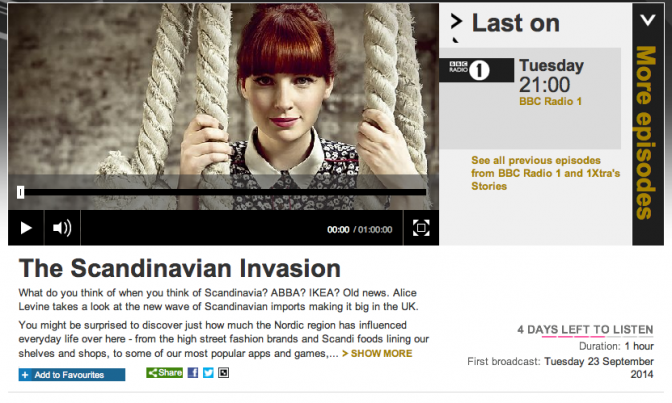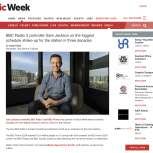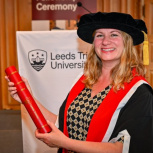Our latest documentary for BBC Radio 1, Scandinavian Invasion, aired this Tuesday! Presented by Alice Levine, it takes an in-depth look at the new wave of Nordic imports making it big in the UK. You can listen to a teaser clip here:
Read moreIt was produced by Lucy Dearlove at Folded Wing and since it's her first BBC documentary, we thought we'd ask her to write a post about what she's learnt during the making of it.
"Getting Scandinavian Invasion commissioned was amazing - I've been Scandi-obsessed for as long as I can remember and so I couldn't wait to get my teeth into the project. When I was researching the pitch I discovered so many things I use everyday that I didn't know were Scandinavian (Spotify, SoundCloud, Candy Crush) and quickly established a number of areas I wanted to look into: music (obviously!), fashion, food, TV and tech and these eventually became the different sections of the doc, broken up by interviews with both up and coming and more established Scandinavian artists.
It was the first time I'd made something this length where I had complete control over the content, and I knew I had a lot to fit in the hour, so I made sure to plan carefully.
Here's a few things I learned while I was making the doc:
1. Always keep your audience in mind
Both Radio 4 and 6 Music have made programmes about Scandinavia in the past, so I knew mine had to stand alone in appealing to the Radio 1 audience. I playlisted it really carefully (this meant some omissions from my personal collection, sorry Jens Lekman!), and tried to address the topics I covered in a way that the listeners would be interested in. A particular challenge with this was when I was working on the TV section; I knew it was important to include shows like The Killing and The Bridge, but I wasn't sure that younger Radio 1 listeners would be too familiar with them. I ended up finding a school who'd used these shows for their Media Studies A-Level course, and they very kindly allowed me to record one of their classes. The students gave a fantastic insight into why the shows are appealing to young people and were a vital part of the finished programme for me.
2. Get to know your presenter
Working with Alice was an absolute pleasure. We went for a coffee in the fairly early stages where she shared some ideas of her own, and we kept in touch over email while I was making it so she could have input with ideas for music and guests. I'd listened a lot to her show to get an idea of her presenting style and tried to write the script with that in mind, which I found really helpful.
3. Be creative with sound
Working with Folded Wing's executive producer Ian Parkinson and studio manager Micky Curling meant that I learnt so much about imaginative ways to use sound to help me tell the story of the programme. Particularly during mixing, they both helped me with loads of ideas about using sounds (from Candy Crush and the soundtrack to Episode 1 of The Killing among others!) to make it an entertaining listen. Sometimes sounds speak louder than words.
4. Inspiration can come from unlikely places
It's always great to get a fresh perspective on something you're working on and loads of people I talked to were really interested in the idea and often volunteered their thoughts. Someone I was sitting next to at my flatmate's birthday dinner first suggested that I look at Eastenders for ideas about how Scandinavian style drama has influenced TV in the UK - which led to the whole Lucy Beale/Nanna Birk Larsen section!
5. Don't make unnecessary work for yourself
When I first started doing interviews for the doc, I was scared that I'd miss something crucial out, so I asked interviewees loads of questions. I quickly realised that this was creating loads of extra work in terms of editing, so I learnt to plan ahead and slim down my questions as much as possible to what I really needed for the finished programme.
6. Be selective with your interviews
Think carefully about who can best tell the story you want to tell. Don't overcrowd with too many voices - time is short in docs, and it's usually best to feature one excellent interviewee rather than three average ones.
7. Make your opening awesome!
It's like an advert for the doc and should immediately draw people in to listen. As you can see above, the opening minute or so ended up being used as a teaser on the BBC Radio 1 SoundCloud. The account has over 280,000 followers so that was amazing for spreading word about the programme.
8. Keep the bigger picture in mind.
When you're making something long form, it can be really easy to get bogged down in making individual sections but I learnt that it really helps to keep in mind what you want to achieve with the finished product. I wanted Scandinavian Invasion to be really entertaining and full of great music but I also wanted listeners to come away having learnt something that they didn't already know. Finding a balance between educational and entertaining was definitely really important. Working with Ian was great for this too - I made sure to check in with him about changes to the structure to check that they'd fit in with everything else I had planned.
9. Edit ruthlessly
In Radio 1 docs there's no space to be sentimental with your speech content. I had to let go of any sentimentality I had about the interviews I'd done and focus on what I needed to tell the stories within the programme. Micky and Ian really helped with this in the final mixing, as there were definitely bits I was clinging to that weren't really necessary.
10. Most importantly, have fun!
If you're not excited by the content that you're collecting, how do you expect the listener to be? Making a radio documentary is a lot of hard work, it's true, but producing an in-depth piece about a subject that you're interested in is so rewarding and an opportunity to be relished. So, if a particular section you're working on isn't quite clicking for you, maybe take a step back and think about how you could produce it differently, and make it more interesting for both you and the listener."
You've still got a few more days to listen to Scandinavian Invasion on the BBC iPlayer, click HERE.










